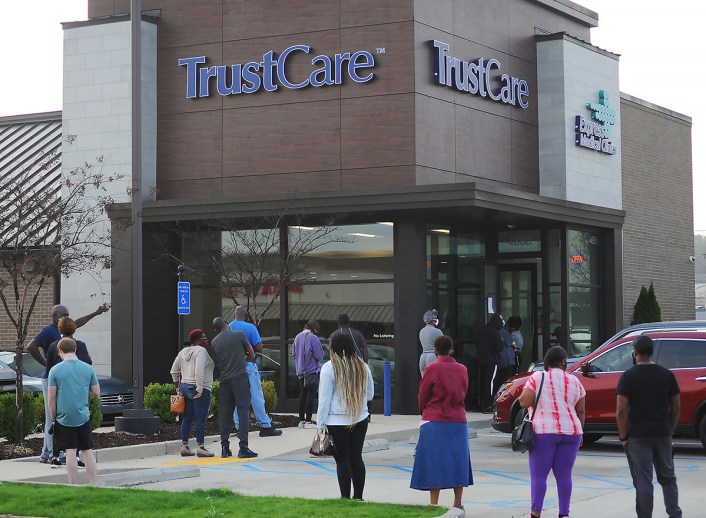Headlines
As Omicron Rages Through MS, Treatments are in Short Supply

By Will Stribling

The omicron wave in Mississippi is in full swing, with the Mississippi Department of Health reporting 4,840 new cases and 37 deaths on Tuesday. The state’s daily average for new infections has increased by more than sixfold over the past two weeks, from 577 to 4,100.
Mississippi has not seen such a sharp spike in new COVID-19 cases throughout the pandemic. The omicron variant is significantly more infectious than all previous variants of the virus, but evidence suggests that it causes less severe symptoms and illness.
Though hospitalization and death rates are lagging indicators, the increases in those outcomes have been far less pronounced thus far in the omicron wave. Over the past two weeks, the number of COVID-19 patients in ICUs has increased nearly 107%. The number of patients on ventilators has increased 54%.
“The number of patients with COVID-19 in ICU care has not risen in this recent surge at the same rate as the increase in the overall patient count and, for the most part, the severity of COVID-19-related cases – including in the ICU – is less severe than in previous surges,” Marc Rolph, executive director of communications and marketing at the University of Mississippi Medical Center, said in an email statement.
Though Mississippi hospitals have not yet been overwhelmed like they were during the delta wave last year, patients seeking care at hospitals or at home will see their options limited due to the national shortage of monoclonal antibody treatments and antiviral pills.
Only one of the three monoclonal antibody treatments approved for use in the United States, sotrovimab, has been shown to be effective against omicron in lab tests. Mississippi received just 283 doses of this treatment this week.
Mississippi also received 270 doses of the Ely Lilly monoclonals and 336 doses of REGEN-COV monoclonals. Though neither of these treatments are effective against omicron, MSDH still recommends they be utilized while the delta variant is still present in the state.
Mississippi is also set to receive a limited supply of two antiviral medications that can be used to treat COVID-19 in an outpatient setting: Molnupiravir and Paxlovid. In clinical trials, the former has demonstrated a 30% reduction in severe illness while the latter showed an 89% reduction.
MSDH anticipates the state will receive additional allocations of these drugs in mid-January, but fewer than 3,000 doses have been allocated to Mississippi thus far.
State Health Officer Dr. Thomas Dobbs said on Tuesday that the limited supply of monoclonals and antivirals will be primarily distributed to MSDH’s 48 COVID Center of Excellence partners, and their use will be targeted to those at the highest risk for severe outcomes, such as people 65 and older and people with compromised immune symptoms.
“We’ve always said that monoclonals are Plan B and the vaccine is Plan A, and you don’t want to rely on your backup plan when Plan A is still an option,” Dobbs said during a press conference last week.
The unvaccinated still make up the vast majority of new COVID-19 cases, hospitalizations and deaths across the state. Between Dec. 7 and Jan. 3, unvaccinated Mississippians made up 98% of cases, 88% of hospitalizations and 72% of deaths.
Health experts across the state and nation are in nearly universal agreement that the best method for protection against omicron is getting fully vaccinated, and then a booster dose if you’re eligible. With only 49% of residents fully vaccinated, Mississippi is still lagging behind most of the country in vaccinations.
Over 446,000 Mississippians have received third or booster doses, and another segment of the population will likely be eligible to receive them soon.
The U.S. Food and Drug Administration approved the use of COVID-19 booster shots of the Pfizer vaccine in 12-to-15-year-olds on Monday.
“Based on the FDA’s assessment of currently available data, a booster dose of the currently authorized vaccines may help provide better protection against both the delta and omicron variants,” Dr. Peter Marks, director of the agency’s Center for Biologics Evaluation and Research, said in a statement. “In particular, the omicron variant appears to be slightly more resistant to the antibody levels produced in response to the primary series doses from the current vaccines.”
The FDA also reduced the period of time fully vaccinated people have to wait before getting a booster dose of the Pfizer vaccine from six months to five months. If a person wants a Moderna booster, they still have to wait the full six months.
The Centers for Disease Control and Prevention must still approve these new policies for them to go into effect. A decision could come soon after a CDC advisory panel meets later this week.
This article first appeared on Mississippi Today and is republished here under a Creative Commons license.









































